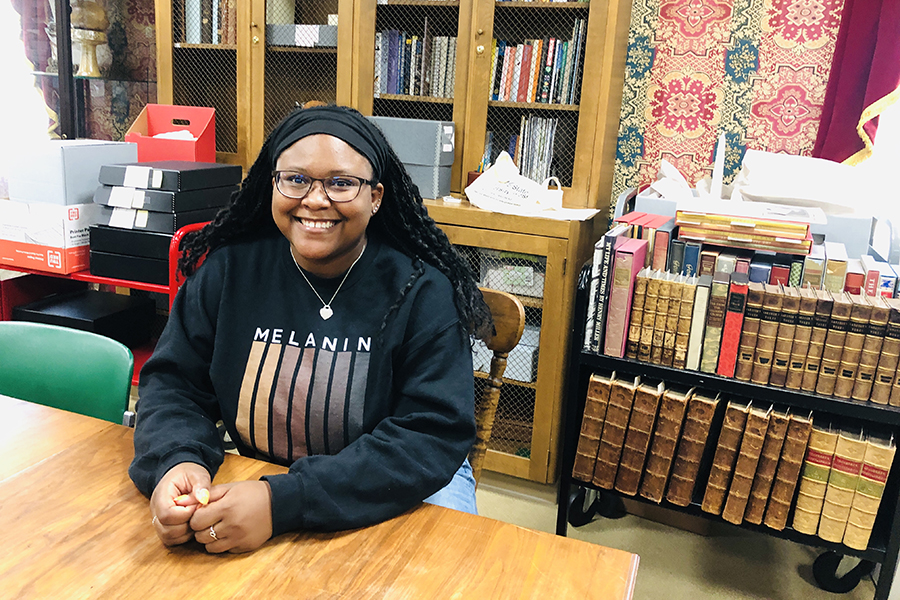Akaiia Ridley, ’22, Shares Insights in Researching Albion College’s Black History
Related Posts
Connect With Us
From uncovering old documents to gathering oral histories from alumni, the Build Albion Fellow’s FURSCA project adds to her experience gained as a student employee in the College archives.
June 24, 2021

Akaiia Ridley is a senior majoring in history with a minor in sociology. Ridley is the child of Aisha Ridley-Melton of Albion and a graduate of Marshall High School.
In 1904, James Welton became part of Albion’s history as the College’s first African American alumnus. He wrote for The Pleiad, served as his junior class treasurer, became a distinguished educator and school administrator in Alabama, and as far as anyone knows, never set foot in Albion after graduating.
The full story of Welton’s life is impressive, but what’s really remarkable is that we know it at all. Despite a 120-year history of educating Black students, Albion knows little about these students who, for better and worse, had “distinctive” lives and experiences just because they were here.
That’s going to change, thanks to Akaiia Ridley, ’22. Supported by the Foundation for Undergraduate Research, Scholarship and Creative Activity, Ridley is working through the Albion College archives to create a virtual “Black History of Albion College” archives exhibit that will gather and present the student lives of this alumni population.
“We looked at yearbooks and The Pleiad and other documents, but didn’t find much,” says Ridley, who has been an archives student worker for the past year. Starting with an initial list of names given by Black Alumni Chapter leader Milton Barnes, ’79, Ridley has been gathering oral histories via research and word of mouth that will be featured in the virtual exhibit.
“I’m not a shy person, but doing these oral histories has sharpened my skills talking to people I don’t know,” she says. “These alumni are doctors and lawyers and executives. They had to understand me and my project before giving me any time. I got really good at explaining the validity of this project.”
As one might imagine, even in Ridley’s first few interviews she has heard stories of discrimination, stereotyping, and being called upon to represent all Black people. In asking what has factored into their success, the answers were likewise consistent—but more surprising.
“A common theme I heard was how Black students had a support system in Albion community members,” Ridley explains. While many alumni from earlier generations were warned to stay out of the City because it “wasn’t safe,” Ridley says that, unanimously, Black alumni discovered the opposite.
“The College had some programs that paired students with community families, and sometimes the Black students just went out and found support on their own,” Ridley says. “All the alumni told me that community families were important to their success. I’m a Build Albion Fellow and this makes me feel good about the City and the College, as there are currently efforts to bridge the gap between the two.”
Among some history she did uncover, Ridley found a sobering document. “In 1968, 22 of the 24 Black students on campus presented a list of demands to the Faculty Steering Committee (FSC),” she says, noting that while The Pleiad reported this news, the actual list was not directly included in the paper. Ridley eventually dug the list out of FSC meeting minutes.
“The 1968 list was essentially identical to a list of demands that was prepared by students in April 2021,” Ridley adds, noting that items like greater diversity among faculty and a more inclusive curriculum are still seen as inadequate by current students. “The 1968 FSC took two years to respond to that list,” she says. “I think the administration is working on our list now.”
Of course, the number of Black alumni isn’t large (the College’s incomplete data includes roughly 700), but even here, Ridley uncovered an interesting fact about diversity. “I called this the ‘Black History Project’ and a Dominican alumna was happy about that, because she isn’t ‘African American,” Ridley says. “Using ‘Black’ is more inclusive.”
Ridley enjoys her job in the archives and is pleased to think that she’s making a positive contribution there. “If we’re going to preserve history, it’s important to talk about all the history and who it belongs to,” she says. “We’re identified as Black students and we should have Black student history.
“People ask me when my project is going to be done and I just laugh,” she adds. “I don’t want it to be done; I want alumni and students to keep adding to this history. I want to be in it someday.”